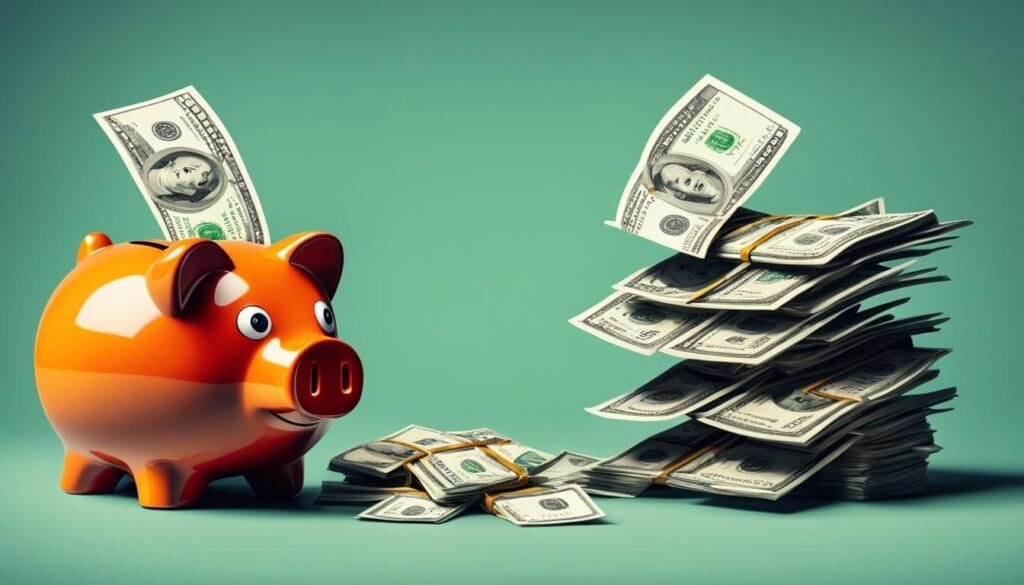The economic crisis of 2008 revealed a failure among economists to anticipate the impending disaster. Many economists used outdated analytical tools that did not account for the role of banks and financial institutions in the economy. The academic orthodoxy of economics focused on the “real economy” and downplayed the importance of the financial sector. This led to a lack of understanding of the risks posed by financial institutions and new financial products. In addition, economic models often disregarded factors like human psychology and expectations about the future, which played a crucial role in the housing bubble. The failure to recognize these risks contributed to the severity of the crisis and raised questions about the reliability and effectiveness of economic predictions.
Key Takeaways:
- Economic crisis psychology examines the psychological impact of economic downturns.
- Economists’ failure to anticipate the 2008 crisis highlighted the need for a better understanding of human behavior.
- Outdated analytical tools and a focus on the “real economy” contributed to the lack of risk recognition.
- Human psychology and expectations play a crucial role in economic crises like the housing bubble.
- Understanding economic crisis psychology can help individuals develop coping strategies and maintain mental health during economic turmoil.
The Skyscraper Index and Other Unconventional Indicators
The construction of the world’s tallest buildings has been identified as a potential indicator of an economic crisis. The completion of the Chrysler and Empire State buildings during the Great Depression, for example, coincided with an economic downturn. This phenomenon, known as the skyscraper index, suggests that a large cluster of tall buildings signifies the end of a building boom and may indicate an economic crisis.
Other unconventional indicators include the men’s underwear index, which suggests that sales of men’s underpants decline during tough economic times, and the hemline index, which theorizes that skirts become shorter during economic upswings and longer during downturns. While these indicators are not foolproof, they provide interesting insights into the relationship between psychology and economic trends.
Skyscraper Index: An Indicator of Economic Crisis
The concept of the Skyscraper Index emerged from the observation that the construction of tall buildings often peaks at times of economic prosperity and subsequently correlates with economic downturns. The idea is that extravagant architectural projects, like skyscrapers, are typically pursued during times of economic exuberance, serving as a manifestation of excessive optimism and growth.
The chart below illustrates the correlation between the completion of skyscrapers and economic crises:
| Skyscraper | Location | Completed | Associated Economic Crisis |
|---|---|---|---|
| Chrysler Building | New York City, USA | 1930 | The Great Depression |
| Empire State Building | New York City, USA | 1931 | The Great Depression |
| Petronas Towers | Kuala Lumpur, Malaysia | 1998 | Asian Financial Crisis |
| Burj Khalifa | Dubai, United Arab Emirates | 2010 | Global Financial Crisis |
While the skyscraper index is an intriguing concept, it should be noted that correlation does not necessarily imply causation, and economic downturns can occur without a surge in skyscraper construction. It is essential to consider other economic indicators and conduct comprehensive analysis before drawing any definitive conclusions.
The Role of Human Behavior in Economic Downturns
Human behavior plays a significant role in economic downturns. Research has shown that bubbles and market instability are driven by psychological factors, such as greed and fear. The experiments conducted by economists like Vernon Smith and Charles Noussair demonstrate that even when the fundamental value of a security is known, asset price bubbles can still occur. This suggests that humans are wired to create asset price bubbles, regardless of their understanding of the underlying fundamentals. Additionally, individuals’ behavior in the financial services industry, driven by the desire for year-end bonuses and short-term profits, can contribute to excessive risk-taking and contribute to financial crises.
The analysis of human behavior in economic decision-making is crucial for understanding and mitigating the risks of future economic downturns.
Investor Psychology
Investor psychology plays a key role in shaping economic outcomes. Irrational behavior in economic decisions, driven by emotions rather than rational analysis, can lead to market inefficiencies and financial instability. Behavioral finance, a field of study that combines economics and psychology, aims to understand and explain these irrational behaviors. It highlights how cognitive biases and heuristics influence investment decisions and skew market dynamics. For example, investors may exhibit herd behavior, following the actions of others without conducting independent analysis. This can lead to the formation of asset bubbles or market crashes. By studying investor psychology, economists and policymakers can gain insights into the factors that contribute to economic downturns and design strategies to mitigate their impact.
“The investor’s chief problem – and even his worst enemy – is likely to be himself.” – Benjamin Graham
Psychological Resilience in Times of Crisis
Psychological resilience refers to an individual’s ability to adapt and cope with challenging situations. In times of economic crisis, maintaining psychological resilience is crucial for navigating the financial turmoil and reducing the negative impacts on mental health. Studies have shown that individuals with higher levels of resilience are better equipped to cope with economic stressors and are more likely to recover from financial setbacks. Building psychological resilience involves developing effective stress management techniques, fostering a positive mindset, and seeking social support. By prioritizing mental well-being and developing strategies to enhance psychological resilience, individuals can better navigate economic downturns and protect their overall health and well-being.

| Key Factors Influencing Human Behavior in Economic Downturns | |
|---|---|
| Psychological Factors | Behavioral Biases |
| • Greed | • Herding |
| • Fear | • Loss Aversion |
| • Overconfidence | • Anchoring |
| • Recency Bias | • Confirmation Bias |
“History suggests that markets react very quickly when they realize that they are dealing with fundamentally flawed assumptions.” – Alan Greenspan
Unusual Economic Indicators to Watch
In addition to traditional economic indicators like employment and consumer spending figures, there are unconventional indicators that can provide insights into the state of the economy. These include the Skyscraper index, Men’s underwear index, Hemline index, and Lipstick index. While these indicators should not be relied upon implicitly, they can offer unique perspectives on economic health and complement traditional economic data.
The Skyscraper Index
The Skyscraper index suggests a correlation between the construction of large buildings and economic crises. Historically, the completion of iconic skyscrapers, such as the Chrysler and Empire State buildings during the Great Depression, has coincided with economic downturns. This index posits that a surge in tall building construction signals the end of a boom and may indicate an impending crisis.
The Men’s Underwear Index
The Men’s underwear index is a quirky yet intriguing economic indicator that tracks sales of men’s underpants as an indicator of financial strain. The logic behind this index is that during tough economic times, consumers may prioritize essential purchases and cut back on non-essential items like underwear.
The Hemline Index
The Hemline index observes the relationship between skirt lengths and market trends. According to this index, skirt lengths become shorter during economic upswings and longer during downturns. The theory suggests that in times of economic prosperity, fashion trends tend to favor shorter skirts as a symbol of confidence and optimism; conversely, during economic downturns, longer skirts represent a more conservative mindset.
The Lipstick Index
The Lipstick index measures sales of small luxuries, particularly lipstick, during challenging economic times. This index suggests that during recessions, consumers may opt for affordable indulgences to boost their mood or make themselves feel better without splurging on expensive items.
While these unusual economic indicators should not replace comprehensive economic analysis, they provide interesting insights and alternative perspectives on economic health. They offer a glimpse into the relationship between psychology, consumer behavior, and market trends. By considering these unconventional indicators alongside traditional economic data, economists and analysts can gain a more holistic understanding of the state of the economy.

Can Economic Instability Have Bizarre Psychological Effects?
The correlation between economic instability and profound psychological impacts is evident. Job uncertainty, financial stress, and unstable markets can trigger anxiety, depression, and even PTSD. The long-term effects of economic instability on mental health are concerning, highlighting the need for support and resources during times of financial uncertainty.
Conclusion
The field of economic crisis psychology illuminates the profound psychological impact that economic crises have on individuals and communities. The failure of economists to predict the 2008 financial crisis underscores the need for a better understanding of human behavior and its role in shaping economic downturns.
Unconventional indicators, such as the skyscraper index and the men’s underwear index, offer valuable insights into the intricate relationship between psychology and economic trends. By studying these indicators and adopting effective coping strategies during economic crises, individuals are better equipped to safeguard their mental health and develop psychological resilience to withstand financial turmoil.
Understanding the deep-seated psychological implications of economic crises is crucial for building a more resilient and stable global economy. By acknowledging the importance of economic crisis psychology, we can create a safer and more sustainable future for all.
FAQ
What is economic crisis psychology?
Economic crisis psychology refers to the study of the psychological impact of economic crises on individuals and societies. It explores the emotional and mental health effects of financial instability and aims to understand how people cope with economic downturns.
What are some coping strategies during an economic crisis?
Coping strategies during an economic crisis may include creating a budget, seeking financial advice, practicing self-care, maintaining social connections, and focusing on personal growth and resilience.
How does an economic crisis affect mental health?
Economic crises can have a significant impact on mental health. They can lead to increased stress, anxiety, depression, and feelings of hopelessness. It is important to prioritize mental well-being and seek support when needed during such times.
How can individuals build psychological resilience in times of economic crisis?
Building psychological resilience during an economic crisis involves developing coping strategies, maintaining a positive mindset, seeking social support, and focusing on personal growth and adaptation. It is also important to practice self-care and engage in activities that promote mental well-being.
What are the psychological implications of economic crises?
Economic crises can have various psychological implications, including increased stress, insecurity, and fear. They can also lead to changes in behavior, such as excessive risk-taking or a decline in consumer spending. Understanding these implications is crucial for managing the psychological impact of economic crises.

